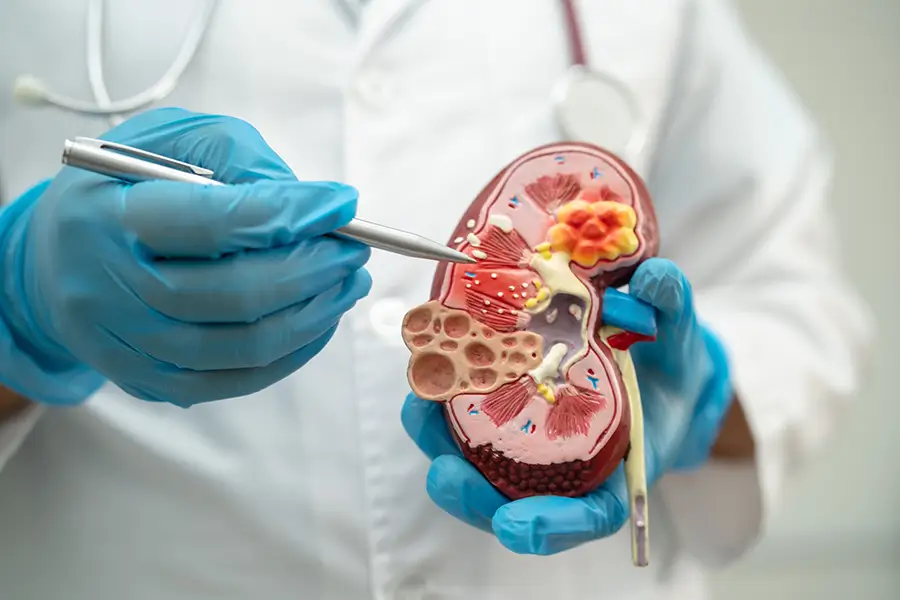How Do Kidneys Work?
Home > How Do Kidneys Work?
The kidneys are remarkable organs essential for maintaining the body’s internal environment. Each kidney is about the size of your fist and is located on either side of the spine just below the rib cage. Kidneys have important functions for the functioning of your whole body.

Removing Waste and Excess Fluid
Function
One of the kidneys’ primary roles is to remove waste products and excess fluids from the bloodstream. This process is carried out through the filtration of blood in tiny structures called nephrons. Each kidney contains around a million nephrons, which filter blood, removing waste products like urea, creatinine, and excess ions, along with water, forming urine.
If the Kidney is Diseased
When the kidneys are diseased or damaged, their ability to filter waste and excess fluid diminishes. This can lead to a dangerous buildup of waste products and fluid in the body, causing symptoms like swelling (edema), fatigue, and shortness of breath. In severe cases, it may lead to kidney failure, necessitating dialysis or a kidney transplant.
How to Care for Kidney Health
To support your kidneys in removing waste and excess fluid, it’s important to stay hydrated by drinking plenty of water. Avoid excessive consumption of salt, which can increase blood pressure and strain the kidneys. Limiting the intake of alcohol and avoiding the use of recreational drugs can also help maintain kidney function.
Filtering the Blood
Function
The kidneys filter the blood, selectively retaining necessary compounds while removing waste products and excess substances. Blood enters the kidneys through the renal arteries and is filtered through the nephrons. The filtration process allows essential substances like proteins and glucose to remain in the bloodstream while removing waste products and excess minerals.
If the Kidney is Diseased
Diseased kidneys lose their efficiency in filtering blood, which can lead to the retention of waste products and toxins. This condition, known as uremia, can cause symptoms such as nausea, vomiting, weakness, and confusion. Additionally, protein or blood may be present in the urine, indicating kidney damage.
How to Care for Kidney Health
Maintaining a healthy diet low in processed foods and high in fruits and vegetables supports kidney health. Regular exercise helps manage weight and blood pressure, reducing the risk of kidney disease. It’s also important to manage conditions like diabetes and hypertension, which can lead to kidney damage if left uncontrolled.
Regulating Blood Pressure
Function
The kidneys play a crucial role in regulating blood pressure by releasing hormones such as renin. Renin helps control the balance of sodium and water in the body, which in turn affects blood pressure. By adjusting the amount of fluid excreted in urine, the kidneys help maintain a stable blood pressure.
If the Kidney is Diseased
When the kidneys are diseased, they may become less effective at regulating blood pressure. This can lead to hypertension (high blood pressure), which further damages the kidneys and creates a harmful cycle. Uncontrolled high blood pressure is a significant risk factor for cardiovascular disease and can accelerate kidney damage.
How to Care for Kidney Health
To keep your kidneys healthy and support their role in regulating blood pressure, maintain a balanced diet rich in potassium and low in sodium. Regular physical activity helps manage blood pressure, and avoiding smoking and excessive alcohol consumption can prevent hypertension. Monitoring your blood pressure regularly and taking prescribed medications as directed can also protect your kidneys.
Producing Red Blood Cells
Function
Kidneys produce erythropoietin, a hormone that stimulates the production of red blood cells in the bone marrow. Red blood cells carry oxygen from the lungs to the rest of the body, which is essential for overall health and energy levels.
If the Kidney is Diseased
Diseased kidneys often produce less erythropoietin, leading to anemia (a shortage of red blood cells). Anemia can cause symptoms such as fatigue, weakness, and shortness of breath. In chronic kidney disease (CKD), anemia is a common complication that needs to be managed.
How to Care for Kidney Health
To support kidney health and red blood cell production, ensure your diet includes sufficient iron, vitamin B12, and folic acid, which are essential for red blood cell formation. Foods rich in these nutrients include leafy greens, lean meats, and fortified cereals. Regular check-ups with your healthcare provider can help detect and manage anemia early.
Producing Vitamins and Hormones
Function
The kidneys are responsible for producing calcitriol, the active form of vitamin D, which is crucial for bone health and calcium metabolism. They also release hormones that help regulate various bodily functions, including blood pressure and red blood cell production.
If the Kidney is Diseased
Diseased kidneys may be less effective at producing calcitriol, leading to weakened bones and an increased risk of fractures. This condition, known as renal osteodystrophy, can significantly impact a patient’s quality of life. Additionally, the imbalance of other hormones can lead to complications such as high blood pressure and anemia.
How to Care for Kidney Health
To support your kidneys’ role in producing essential vitamins and hormones, ensure you get adequate calcium and vitamin D through diet and supplements if necessary. Regular exposure to sunlight can also help maintain healthy vitamin D levels. Monitoring your bone health and discussing any concerns with your healthcare provider can help manage potential complications.
Managing Nutrient Levels
Function
The kidneys help regulate the balance of certain nutrients in the body, such as calcium and potassium. They adjust the excretion of these nutrients through urine to maintain proper levels, which is essential for normal bodily functions like muscle contractions and nerve signaling.
If the Kidney is Diseased
When kidneys are diseased, they may struggle to maintain the proper balance of nutrients. This can lead to hyperkalemia (high potassium levels), which can cause muscle weakness and heart rhythm problems. It can also lead to imbalances in calcium, potentially resulting in weakened bones and other health issues.
How to Care for Kidney Health
To help your kidneys manage nutrient levels, maintain a diet that balances the intake of potassium, calcium, and other essential nutrients. Foods high in potassium, such as bananas, oranges, and potatoes, should be consumed in moderation if you have kidney concerns. It’s also important to follow any dietary recommendations provided by your healthcare provider or dietitian.
Kidneys are Small but Powerful
Understanding how kidneys work highlights their critical role in maintaining overall health. These small but powerful organs remove waste and excess fluid, filter the blood, regulate blood pressure, produce red blood cells and essential vitamins, and manage nutrient levels. When kidneys are diseased, these functions are compromised, leading to a range of health issues.
Caring for your kidneys involves maintaining a healthy lifestyle, staying hydrated, eating a balanced diet, exercising regularly, and managing any chronic conditions such as diabetes or hypertension. Regular check-ups with your healthcare provider can help detect any issues early and ensure that your kidneys continue to function optimally. By taking these steps, you can support your kidney health and enhance your overall well-being.
